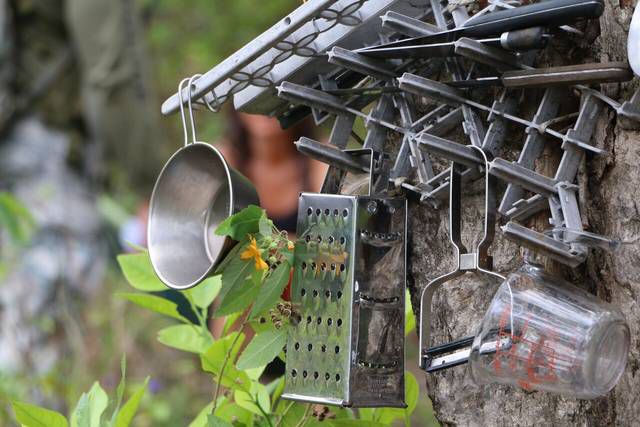KALALAU — A three-day sweep in the Kalalau Valley this week led to 11 arrests — and the discovery that for some there, life included all the comforts of home. One camp had a pizza oven, an enclosure with a
KALALAU — A three-day sweep in the Kalalau Valley this week led to 11 arrests — and the discovery that for some there, life included all the comforts of home.
One camp had a pizza oven, an enclosure with a queen-sized bed, what appeared to be an alcohol still, and an extensive system of solar- and battery-powered lights for its marijuana-growing operation.
That camp is where squatters had recently posted a web video depicting a party, said officials with the state Department of Land and Natural Resources Division of Conservation and Resources Enforcement.
Squatters also cleared native trees to build shelters and created water diversions to grow cannabis and other plants, according to the state.
The water diversions appear to have been made by using pieces of archaeological sites.
“People are modifying heiau for modern-day purposes,” said Curt Cottrell of the DLNR Division of State Parks. “We need to protect our historic culture in Kalalau Valley.”
A 20-year-old man, who could not produce identification, was handcuffed and flown out of the park and booked on charges at the Kauai Police Department.
That brings the total to 28 people arrested so far in May for failing to have permits required to travel anywhere past the two-mile marker on the Kalalau Trail.
So far this week, officials discovered 12 illegal camps in the Kalalau Valley and, as of Friday afternoon, spotted a few more and planned to investigate them.
At one camp they confiscated an illegal crossbow.
“They’re certainly taking our wildlife back there, and a crossbow — that’s not a legal form of take,” said DOCARE Enforcement Chief Robert Farrell, who entered the Kalalau Valley for the first time during the most recent enforcement effort.
A total of 30 marijuana plants were pulled and confiscated during the three-day law enforcement operation.
“We found seedlings all the way to budded plants, and we didn’t get all of them,” said Cottrell. Around one dozen officers from DOCARE and the state Department of Public Safety’s Sheriff Division participated in the latest crackdown.
Farrell, who previously worked as a game warden in California as well as in the field on Hawaii Island, said, “What’s happening in Kalalau is reminiscent of illegal pot growing operations on state and federal lands in California. Like the California marijuana growers, the Kalalau squatters have no regard for the law or for protection of natural and cultural resources.”
“People with permits should be able to enjoy one of the most unique and beautiful landscapes on the planet without the fear of being harassed or having their experience diminished or threatened by those who simply do what they want, where they want, and how they want,” Farrell said. “We are continuing to have zero tolerance for these kinds of behaviors and when we catch you, you will be arrested.”
The Napali Coast’s rugged terrain makes it difficult for officers to enforce laws in the valley, and enforcement can become expensive when officials must spend several days and use helicopters to accomplish their goals. Beyond satellite phones, communication is limited.
“There are a lot of places for people to run and hide, and though clearly some of the camps had significant populations, once they know we’re coming in, they hide,” Farrell said.
In the past two years, law enforcement officials have arrested more than 200 people for illegally staying in the valley.
“We still have work to do,” Farrell said.
State Parks needs a dedicated employee or two to focus solely on Kalalau Valley, Cottrell said, as well as more financial support for enforcement and management of the Napali Coast.
Social media has been helpful for enforcement, he said, even though it presents a double-edged sword because more people are exposed to remote areas through the internet.
“We have more people in way more areas than we have before,” he said. “We appreciate the direction we’re getting from social media, but we need dedicated parks staff to the site.”
A state DLNR spokesman said it will be up to State Parks personnel to dismantle the illegal camps, a move to occur later this year with DOCARE assistance.
•••
This story has been updated to indicate Cottrell was not part of the team that went into Kalalau Valley, and to add new information about plans to dismantle illegal campsites and survey and restore cultural sites.




